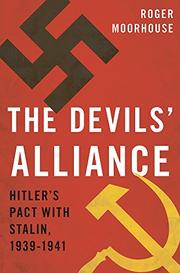
Placing the infamous Molotov-Ribbentrop Pact squarely at the center of Soviet-German belligerence before the outbreak of World War II.
English historian Moorhouse (Berlin at War, 2010, etc.) finds that the Hitler-Stalin nonaggression pact of August 1939—with its “secret protocol” to carve up Poland and the Baltic states—is not well-understood in the West and is still rationalized by “communist apologists” today. The pact, which lasted less than two years and ended with Hitler’s invasion of the Soviet Union on June 22, 1941, indeed “turned the political world upside down,” as it created bedfellows between two sworn enemies who had long denounced the other as attempting world domination. Hitler had gained power by railing against the “Jewish Bolshevist plague,” while Stalin had decried German expansionism in the East since the Treaty of Brest-Litovsk in 1918. Moorhouse nimbly shows how this cynical alliance came about: Hitler needed to guard his eastern flank in his expansion into Czechoslovakia (Bohemia and Moravia were rich in minerals and industry), and intractable Poland could not be brought around without force; moreover, an alliance with the resources-rich Soviet Union would feed Hitler’s war. The author attempts to clarify Stalin’s rationale in pushing for this pact as not simply being a defensive move or a way of buying time until the Soviets were prepared for war. Rather, it was a “passive-aggressive” grab at territory and power, a chance to “set world-historical forces in motion” and thumb his nose at Western imperialist powers. The impact was huge, as 75 million people were affected by the newly designated borders, causing massive deportations and purges and creating parallel (and collaborative) systems of terror and repression by the NKVD and the Nazi SS. Moorhouse offers a thorough delineation of the characters involved, as well as the extraordinary contortions each side exercised in order to justify the malevolent agreement.
A well-researched work offering new understanding of the pact’s pertinence to this day.
No comments:
Post a Comment